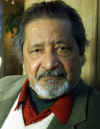| the-south-asian.com JANUARY 2002 | |||
| about us contact us data bank past issues the craft shop the print gallery | |||
|
JANUARY 2002 Contents Literature Pakistani
Literature Visual Arts South
Asian Art -
shared Rare
photographs of Indian Outlook Technology India
& China - major global Foreign
Investors in India's People Sports Books 'Knock
at Every Alien Door' Society
Books
|
V S Naipaul Nobel Prize in Literature 2001 V S Naipaul - AP PhotoVidiadhar Surajprasad Naipaul was awarded the 2001 Nobel Prize for Literature last month. The announcement of the award in October was received with mixed reactions – bordering almost on an East-West divide. The accolades have almost invariably come from the West, while the East has been more critical of his writing. Naipaul is one of the controversial writers of our times. His critics allege that his books on India and the Islamic World reflect insufficient understanding of the region, its people, and its spirit. He has been accused of cultural insensitivity. To others, his perceptions and what he observes seem objective, relevant and astute. The Swedish Academy’s Press Release on the following pages explains what makes Naipaul a worthy writer. Amitav Ghosh, another bright writer from India, writes his views in "Naipaul and the Nobel". Naipaul, in his Nobel Lecture, speaks of his childhood and adolescence in Trinidad and all the social and environmental inputs he absorbed and the cultural vacuum that compelled him to travel to India and later to other regions – journeys that were subsequently immortalised into books.
The Swedish Academy on Naipaul
Copyright © 2000 - 2001 [the-south-asian.com]. Intellectual Property. All rights reserved. |
||
